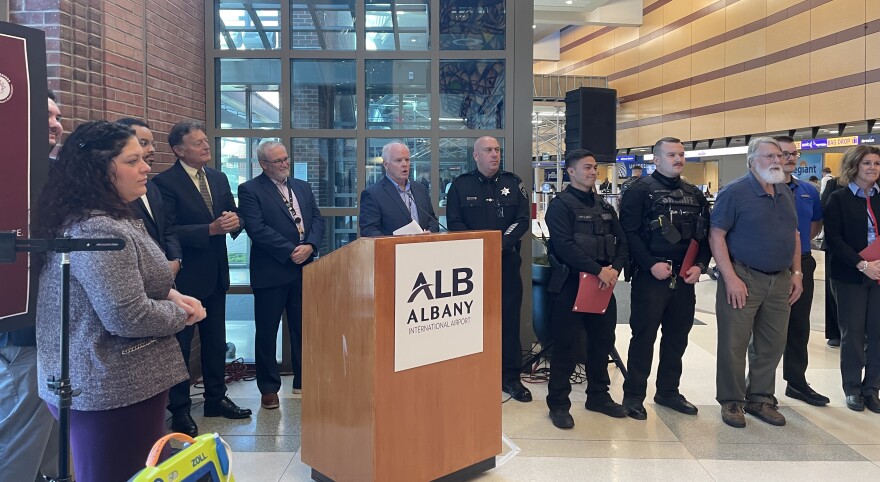On Sept. 8, John Bonhotal said he felt weak and dizzy before collapsing.
Bonhotal woke up in the ambulance, meaning he didn’t get to meet the people at the airport who saved his life. At least not until a press conference at the airport Thursday to mark World Restart a Heart Day. Along with the Southwest staff members who administered CPR were first responders from Colonie EMS, and Albany County Sheriff’s Department deputies who responded to the 9-1-1 call.
Bonhotal stressed the sudden nature of his cardiac arrest, saying that he felt perfectly fine until that fateful moment.
“Well, leading up to it, I remember I was carrying my duffel bag, which had all my hiking here, and it was quite heavy. I was probably carrying well over 100 pounds worth of gear on my back and in the bag. And you know, I stopped a couple of times to rest, but other than that, I was feeling okay. I was a little tired because it's early in the morning, but I really was fine up until the moment I went down.”
Southwest staff responded with CPR immediately, and retrieved an Automatic External Defibrillator (AED) as quickly as possible. They called 9-1-1, and the Albany County Sheriff’s Department’s deputies responded to the call. Colonie EMS Assistant Chief Robbie MacCue, who was the shift commander that day, said that the response time in Bonhotal’s case was ideal, and significantly increased his chance of survival.
“Before the first responders got there, those two bystanders from Southwest stepped in. They immediately started CPR. They ran to get their defibrillator, and within three minutes, that first shock was delivered. So the absolute perfect case of why we need to have everyone having access to AEDs, and how simple it is. John's a testament that he's here today because somebody knew how to do CPR and got that AED.”
MacCue also provided a demonstration of CPR and how to use an AED. He emphasized the importance of education about cardiac arrest and how to help those who are suffering from it. Bonhotal encouraged the public to learn how to do CPR and use an AED, and emphasized the importance of that training – because it could happen to anyone at any time.
“It's of paramount importance. And, as I said, when I was speaking to the group, you know, if you're able to get trained in CPR and use of an AED, it's very simple, not hard to use at all. The AED is nothing to be afraid of. It won't hurt you, and it won't shock the victim or the patient, unless they are in cardiac arrest.”
Bonhotal, who lives in Greenville, New York, is a dedicated hiker, and a regular in the Catskills. He returned to the trails two weeks after his cardiac arrest, and plans to make it to Denver next year to hike the Rocky Mountains. He’s grateful to the people who saved his life for giving him the chance to return to hiking.
“There are no words. They're just wonderful people. I can't believe how quickly everybody responded, and I'm really thankful for today that I was able to thank them in person.”
Bonhotal has been undergoing treatment for heart health issues for years, but his cardiac arrest deepened his resolve to live life to the fullest.
“I have cardiac issues anyway, for a lot of years, so I made a personal decision, to live every day like it's your last.”



